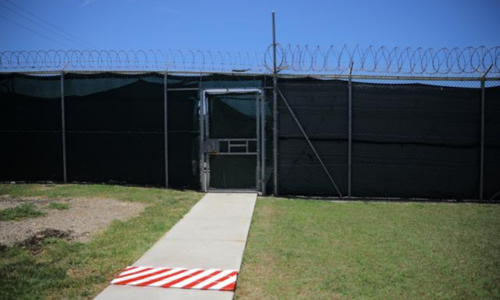Seven senior US military officers who last week sentenced a Guantanamo Bay detainee to 26 years in prison issued an appeal for clemency in his case, calling his torture by the Central Intelligence Agency (CIA) a “stain” on America in a letter published on Sunday.
In the first-ever public account of torture by someone detained in the wake of the September 11 attacks, Pakistani national Majid Khan told the sentencing jury how he was raped, beaten and waterboarded by CIA interrogators.
Khan was sentenced at the US naval base in Cuba on October 29, after pleading guilty to helping in Al Qaeda plots in 2002.
But in a handwritten letter first published by The New York Times, seven of the officers on the eight-member sentencing jury denounced his treatment as “a stain on the moral fibre of America”.
The letter was confirmed to AFP as authentic by the military commissions at Guantanamo Bay.
“The panel members listed below recommend clemency in the case of Majid Shoukat Khan,” said the officers, who included six Army and Navy officers and one Marine. They signed the letter with their juror numbers, remaining anonymous.
“Mr Khan committed serious crimes against the US and partner nations. He has plead guilty to these crimes and taken responsibility for his actions. Further, he has expressed remorse for the impact of the victims and their families,” they wrote.
It is unclear what if any impact the letter may have, however remarkable the stance taken by all but one of the active duty service members on the jury.
Based on an earlier plea deal — of which the jurors were not aware — Khan stands to be freed as early as next year, after spending 19 years in US custody.
Khan was allowed to tell his story after agreeing not to divulge classified information. He described in a 39-page statement being tortured in Pakistan, Afghanistan and a third country following his capture in Karachi in March 2003.
“Mr Khan was subjected to physical and psychological abuse well-beyond approved enhanced interrogation techniques,” the letter said. “This abuse was of no practical value in terms of intelligence, or any other tangible benefit to US interests.
The letter-writers said the youthful Khan had been a “vulnerable target for extremist recruiting”, having been mourning the loss of his mother at the time.
“Now at the age of 41... he is remorseful and not a threat for future extremism,” the officers said.
Khan, who grew up in Pakistan and moved to the United States at the age of 16, attributed his decision to help Al Qaeda to poor judgment.
“I'm not the young, impressionable, vulnerable kid I was 20 years ago,” he told the court. “I reject Al Qaeda, I reject terrorism.”
His testimony on torture is supported by the US Senate's own investigation of the CIA's use of torture following the September 11, 2001 attacks.















































